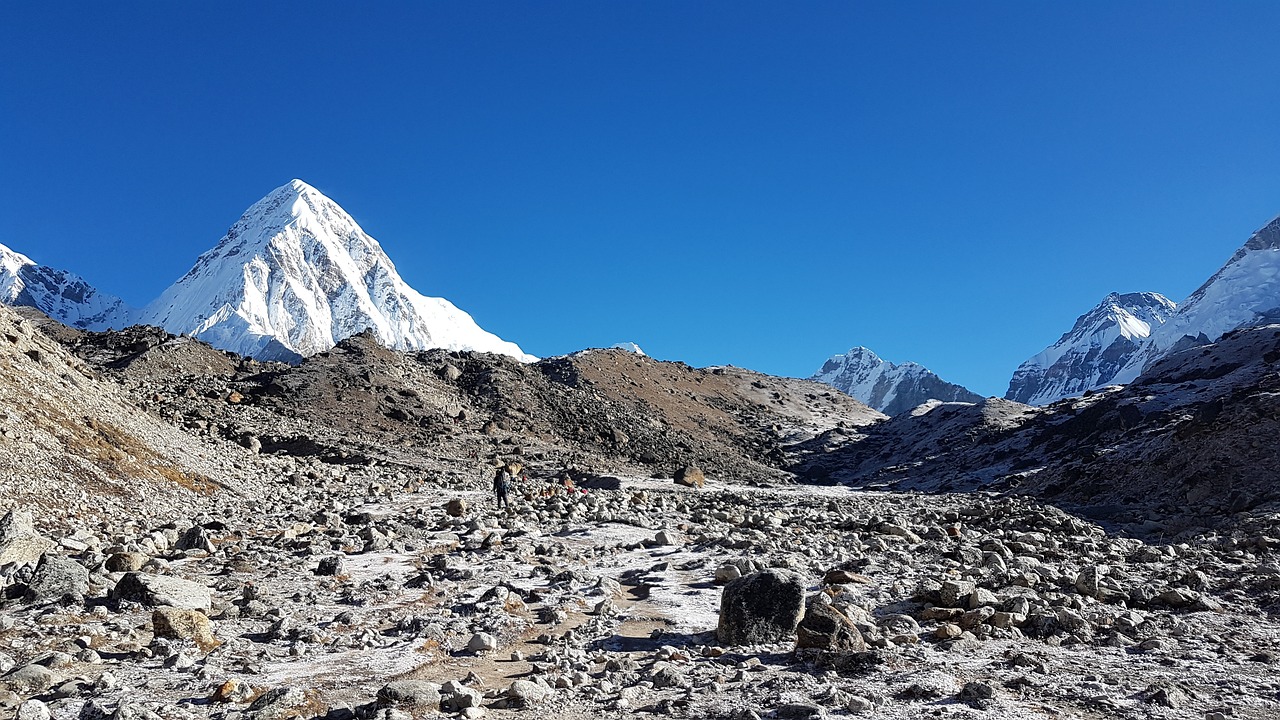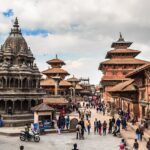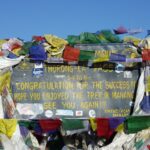Everest Base Camp Trek Nepal is a must-do trekking package in Nepal; if you are young, energetic, and interested in travel, trekking, etc., it’s for you. A land of greener mountains and beautiful landscapes is home to one of the world’s most iconic and challenging treks—the Everest Base Camp trek, also sometimes called EBC. Situated in the heart of the Himalayas, the Everest Base Camp offers adventure enthusiasts a once-in-a-lifetime opportunity to witness the grandeur of Mount Everest, the tallest peak on Earth. This travoglad blog series shows a journey to Everest Base Camp, exploring the route, the challenges, and the rewards.
Table of Contents
Unveiling the Route:
A beautiful Everest Base Camp trek starts with a scenic flight from Kathmandu to Lukla, a small mountain town that is the gateway to the Khumbu region. From Lukla, trekkers embark on a two-week expedition through rugged terrain, traversing trails that wind through picturesque Sherpa villages, enchanting rhododendron forests, and high-altitude landscapes. Along the way, travellers can see breathtaking views of towering peaks, which are remarkably remarkable to keep their memory forever in the future. Finally, after enduring challenging ascents, descents, and acclimatisation treks, trekkers reach the Everest Base Camp at 5,364 meters (17,598 feet).
Challenges on the Path
Tons of challenges for the Everest Base Camp trek is no small feat. Trekkers must prepare to face a range of physical and mental challenges. The high altitude presents the foremost obstacle, as it can lead to altitude sickness. Proper acclimatisation is crucial, with trekkers taking regular rest days and ascending gradually to allow their bodies to adjust to the thin air. The rugged terrain, steep ascents, and descents demand good fitness and endurance. Trekkers should engage in pre-trek training and conditioning to tackle the demanding trail effectively. If the route is challenging for you and is not suitable, you may select Everest Base Camp Helicopter Tour, which is a quicker way, but expensive option.
Rewards of the Journey
Base camp Everest trek is a test of physical endurance and an opportunity to immerse oneself in the rich Sherpa culture and awe-inspiring natural beauty. Along the trail, trekkers pass through vibrant Sherpa villages like Namche Bazaar, Tengboche, and Dingboche, where they can experience the warm hospitality of the Sherpa people and witness their distinct way of life. The region is also dotted with ancient monasteries, prayer flags, and mani walls that add a spiritual touch to the journey.
The reward for reaching Camp is a breathtaking panorama of snow-covered peaks, including the majestic Mount Everest. The Everest Base Camp also serves as a hub for mountaineers preparing to summit Mount Everest, and witnessing their efforts and determination is an inspiring experience.
Essential Packing List
To ensure a successful and comfortable trek to Everest Base Camp, trekkers must pack wisely. Here is a list of essential items to include:
-Sturdy hiking boots: Provide ankle support and grip on uneven terrain.
-Layered clothing suitable for varying temperatures: Include moisture-wicking base layers, insulating mid-layers, and a waterproof outer shell.
-Sleeping bag designed for cold weather: Make sure it protects you well below zero degree temperature
-Trekking poles: Aid stability and reduce joint strain during ascents and descents.
-High-quality sunglasses and sunscreen: Protect your eyes and skin from the harsh mountain sun.
-Waterproof and windproof outerwear: Essential for unpredictable mountain weather.
-First aid kit with altitude sickness medication: Carry basic medical supplies and consult a healthcare professional for altitude sickness prevention.
-Snacks and energy bars: Provide sustenance during long trekking days.
-Camera: Capture the incredible landscapes and memories of your journey.
Everest Base Camp Helicopter Tour
The Everest Base Camp Helicopter Tour offers a thrilling and efficient way to experience the Royal beauty of the Himalayas of Nepal. Departing from Kathmandu, the helicopter takes you on a scenic flight towards the Everest region. As you soar above the rugged terrain, you will be treated to breathtaking views of snow-capped peaks, deep valleys, and picturesque villages. Upon reaching Everest Base Camp, you can explore the area and take in the awe-inspiring surroundings. This tour provides a unique and unforgettable adventure, allowing you to witness the world’s highest mountain up close to you.
Base camp Everest is a popular destination for adventure-seeking tourists. Every year, many people embark on the Everest base camp. Along the way, you can see beautiful views of Mt. Everest, Mt. Lhotse, Cho Oyu, and other majestic peaks. The famous Kala Patthar viewpoint offers a stunning perspective of Mt. Everest, and the highest hotel in the world, Hotel Everest View, is a must-visit. Trek also provides an excellent opportunity to immerse oneself in the Sherpa culture by passing through Himalayan villages like Namche Bazaar and Tengboche. Buddhist monasteries, stupas, and Mani walls add to the cultural experience. The journey begins with guided sightseeing in Kathmandu and a scenic flight to Lukla. Prepare for an unforgettable adventure in the Himalayas.
Cost of Helicopter Trip From Kathmandu to Everest Base Camp
Helicopter Trip costs may change from time to time
—However, some general information regarding helicopter tours from Kathmandu to Everest Base Camp. Helicopter base camp tour costs can vary by several factors, including the tour operator, tour duration, type of helicopter, and additional services included. Generally, helicopter tours to Everest Base Camp are expensive due to the remote and challenging nature of the region.
The cost of a helicopter tour from Kathmandu to Everest Base Camp could range from approximately $5,000 to $7,000 per helicopter for a private tour. This cost typically includes round-trip transportation from Kathmandu to Everest Base Camp and back and a brief landing at either Everest Base Camp or a nearby viewpoint for a close-up view of the mountain.
It’s important to note that these prices are subject to change and can vary based on market situation, demand, and the services provided by different tour operators. It’s advisable to contact reputable tour operators or travel agencies in Nepal for the most up-to-date and accurate pricing information.
Additionally, remember that helicopter tour services may cancel or reschedule due to unfavourable conditions because weather conditions change quickly.
In summary
Embarking on the Everest Base Camp trek is an adventure of a lifetime—an opportunity to challenge oneself, witness unparalleled natural beauty, and immerse in the Sherpa culture. The journey to the roof of the world demands dedication, preparation, and a spirit of adventure, but the rewards are immeasurable. Standing at Everest Base Camp, surrounded by towering peaks, is a humbling experience. So, quickly lace up your boots, prepare your backpack, and move on toward the Everest Base Camp—the ultimate adventure awaits
FAQ about trekking to Everest Base Camp
Here are some frequently asked questions about trekking to Everest Base Camp and their answers
Q1: How long does it take to trek to Everest Base Camp?
A1: The trek to EBC takes around 12-14 days, depending on the itinerary and the place of the trekker.
Q2: What is the best time of year to trek to Everest Base Camp?
A2: The best time to trek to Everest Base Camp is during the pre-monsoon (spring) season (March to May) and the post-monsoon (autumn) season (Sep. to Nov.)
Q3: Is prior trekking experience necessary to trek to Everest Base Camp?
A3: While prior trekking experience is not mandatory, Be fit and have a good fitness level and some hiking experience preferable.
Q4: What is the difficulty level for the Everest Base Camp trek?
A4: The Everest Base Camp trek is moderately complex. It involves long days of trekking, steep ascents and descents, and high altitude, requiring physical endurance and mental determination.
Q5: How do I prepare for the altitude during the Everest Base Camp trek?
A5: Adequate acclimatisation is essential. It is advisable to take regular rest days and ascend gradually to allow your body to adjust to the thin air. Hydration and a slow and steady pace are also crucial.
Q6: Do I need a permit to trek to Everest Base Camp?
A6: Yes, trekkers need to obtain two permits: the Sagarmatha National Park entry permit and the Khumbu Pasang Lhamu Rural Municipality permit. These can be obtained in Kathmandu or in Monjo, a village along the trekking route.
Q7: Are tea houses or lodges available along the Everest Base Camp trek?
A7: There are numerous tea houses and lodges along the trekking route that provide accommodation and meals for trekkers.
FAQ continue…
Q8: Can find the the place to charge for cameras or phones during the trek?
A8: Yes, most teahouses provide charging services for a small fee. However, carrying spare batteries and power banks as a backup is advisable.
Q9: Are there ATMs available along the Everest Base Camp trekking route?
A9: Limited ATMs are available in some villages along the route, such as Namche Bazaar and Lukla. Please carry enough cash in local currency for the entire trek.
Q10: Is hiring any guide and porter necessary for the EBC trek?
A10: Hiring a guide and porter is a personal choice. While it is not mandatory, having a guide can enhance the trekking experience by providing local knowledge, ensuring safety, and assisting with navigation.
Q11: What are the risks associated with trekking to Everest Base Camp?
A11: The main risks include altitude sickness, extreme weather conditions, and challenging terrain. Adequate preparation, proper acclimatization, and following safety guidelines can minimize these risks.
Q12: What physical fitness level is required for the Everest Base Camp trek?
A12: An excellent cardiovascular fitness, strength, and endurance level is recommended. Engaging in regular aerobic exercises, such as hiking, jogging, or cycling, before the trek. It helps
Q13: Is travel insurance necessary for the Everest Base Camp trek?
A13: Yes, it is highly recommended to have comprehensive travel insurance that covers medical emergencies, medical evacuation, and trip cancellation.
Please note that while the provided answers are based on general information, individual circumstances and conditions may vary. It is always advisable to consult with experienced trekking professionals or local authorities for the most accurate and up-to-date information before undertaking the Everest Base Camp trek. Have good luck and a safe move.



